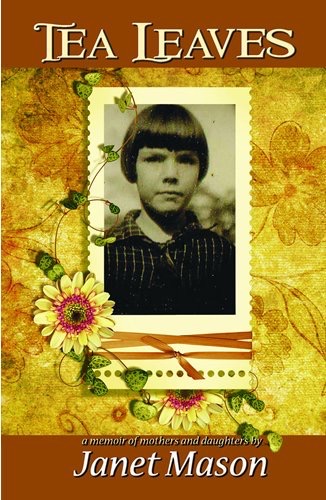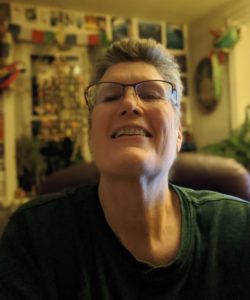a memoir of mothers and daughters
by

In this forthright personal memoir, author and poet Janet Mason reflects on the factory-worker lives of her mother and grandmother in working class Philadelphia while she copes with her mother’s final illness. Her mother’s feminist example and unwavering support of a lesbian daughter become increasingly poignant as Janet explores the choices not open to her mother that she made for herself.
Equally pressing is the sheer labor of dealing with medical misdiagnosis and subsequent treatment of her mother, and the toll it takes on her own relationship as she spends increasing hours in conversation with the woman who gave her life.
Tea Leaves is about daughters, mothers and women, their choices, and the never-ending circles of their entwined lives.
- 1 To Be Read list
Publisher: Bella Books
Editors:
Genres:
Pairings: F-F, F-F-M, M-F
Heat Level: 2
Romantic Content: 2
Ending: Click here to reveal
Character Identities: Gay, Genderfluid, Genderqueer, Lesbian
Protagonist 1 Age: 18-25
Protagonist 2 Age: 66+
Tropes: Class Differences, Death of Parent, Fairy Tales Revisited
Word Count: 70000
Setting: suburbs
Languages Available: English
Two weeks after her hunger strike as we sat together in the living room, my mother told me she wanted to take a walk. It was a beautiful sunny day. Lips pressed together in a firm resolve, she leaned forward, grasping the rounded end of her wooden cane and pushed herself up from the chair. She walked around the end of the couch toward the stairs where she braced herself against the wall with her left hand. With precise determination, she used the straight end of the cane with the rubber stopper to retrieve first one sneaker and then the other.
READ MOREEvery muscle in my body twitched in her direction. I checked my urge to get her sneakers, to help her put her feet into them, to do the things for her that had become difficult but that she was still able to do for herself. Suddenly she was the child and I the mother. I needed to let her do this for herself, to not hover anxiously above the child taking her first steps, or the mother taking what could be her last. She let me go. Now it was my turn.
She held back the tongue of her gray and white running sneaker with her cane, slipped her right foot into the shoe, then pushed down the Velcro tabs with her cane.
Before she started with the second sneaker, she looked up, a gleam of satisfaction in her eyes.
“I always thought,” she said, in a thoughtful, faraway voice that sounded as if she were talking as much to herself as to me, “that I could’ve been a lesbian.”
I looked up, startled.
As she stood next to the stairs, leaning both hands on her cane, she looked at me keenly, as if looking into my life and beyond, back into hers.
“You remember my friend Mary from the organic gardening club. I think we would have been lesbians if we had the chance. One day she asked me if I liked sex. I think if it had been another time, we would’ve just done it. What’s the big deal about sex? America is so puritanical. I think that’s why the big fuss about gay rights.”
My mother stepped out with her left leg, shifting the weight that she was leaning on her cane. She braced herself against the wall again, reaching out with the cane to retrieve her other sneaker. After she pulled it over next to her foot, she looked back up at me.
“Don’t get excited,” she said. “We didn’t do anything.” She looked down at her sneaker.
A smile was curling the edges of my lips. I thought about mentioning the difference between “Do you like sex?” and “Would you like to have sex?” But I didn’t.
My mother looked up, her eyes narrowed to the pinpoint of a precise memory. “Now Vera, the woman who was in my nursing program, she was something special.” My mother looked past me, far into the distance. “She had nice broad shoulders like your father. And boy was she interesting to talk to. She walked like a man, her feet pointing to the outsides. She didn’t pretend to be anything she wasn’t, so everyone knew she was a lesbian.
“None of the other women wanted to have anything to do with her, even the other black women. They were all cats. But I liked her. When you listened to her talk you knew she had something between her ears. She really knew how to think for herself. When she put her hand on my knee, I didn’t say anything. I just pushed her hand away like I would do to a man. Poor woman, I was probably the only one in the program who had a kind word for her.”
My mother’s eyes reddened, and she looked down. Again at her sneaker. Putting on her shoes, this daily incidental that had become a monumental task.
I had heard the story of Vera before, about the hand on the knee, a reminder in my preadolescence, when lesbianism was still a foreign concept, that all people should be treated fairly, with respect, like the human beings they are. But today my mother’s reminiscence put Vera in sharper focus for me, this broad-shouldered black lesbian, this woman ahead of her time who, despite the small-minded women in the nursing program, despite the closed doors of the fifties, could risk breaking all taboos, to place her hand on the knee of a straight, white, married woman, who at forty years old was pregnant with her first and only child.
I imagined myself in my mother’s womb, a place I have never dared to think of, curled up tight, growing larger in the amniotic fluids that transmitted the touch of Vera’s hand on my mother’s knee, perhaps feeling a flutter of excitement, then the light brush of my mother’s arm across her stomach, sweeping away Vera’s hand, keeping all that she was expected to be in place. It’s quite possible that in 1959, the desire that was dormant or repressed in my mother was handed to me, a gift embedded in the vibrational frequency that formed me.
COLLAPSEBook Friend on Amazon wrote:An Epic Mother-Daughter Journey for the Ages!!
TEA LEAVES arrived on a day-off from work so as it turns out I could devote myself to the luxury of hour after hour of uninterrupted reading. And so it began. What an awesome book!! Janet Mason has done an amazing job capturing the lives of three generations of women -- mother, daughter, grandmother; higher education and aspirations, the meaning of class in America, the shameful failure of modern medicine to listen to and serve women,the power of healing alternatives, the meaning of work vs jobs, coming out, balancing relationships with responsibilities in times of disaster, and coming to terms with the death of someone who is irreplaceable-- all there and more. Props to Janet!! I hope she's proud of herself as an author -- her book is truly a stunning and memorable literary achievement.
Foxx on Amazon wrote:The memoir is brilliant. There is not a wasted word as Mason connects her mother’s back stories with Mason’s own experiences in exploring and discovering herself. She has a gift in taking the most ordinary occurrences and giving them a unique perspective that is at once personal and universal.
Tea Leaves, a memoir and a remarkable read!
Reading Tea Leaves, a memoir of mothers and daughters, by Janet Mason (published in 2012 by Bella Books), was like looking in a mirror at my own life. The book is the story of an adult daughter who, on finding out that her mother has fourth-stage terminal cancer, returns to care for her. I, too, cared for my mother at the end of her life and even though the circumstances were different, Tea Leaves held a great deal of emotional resonance for me.
When Janet returns to take care of her mother, she encourages her to tell her family stories - and for the last time, she listens to her mother talking about her own mother, who worked in a textile mill in the Kensington section of Philadelphia. Their family came from Bradford, England (a town known for its decaying textile mills that were in full force during the Victorian era) and Janet's grandmother, Ethelind Elizabeth, had illusions of being related to English Royalty. Her dying mother, Jane, scoffs at this ("Royalty, my arse," she says) but somewhere in her childhood she must have believed her mother. On her one trip abroad, she traveled by herself to England and when the tour bus stopped in Bradford, she refused to get off the bus.
"Thinking about her mother's devotion (which my mother most likely thought of as subservience) to the church, my mother slammed the guidebook shut. There was nothing here that was any better than her mother's life working in the textile mill. The mill was like an evil fairy tale--her mother and her mother and her mother before her had all pricked their fingers on a spindle and the life drained out of them."
The writing is lyrical and mesmerizing. The character, Jane(the mother), is amazingly funny - a personality attribute that enabled her, as well as her caretakers, to get through this difficult time. In writing about her mother, Mason treads a tightrope between the profane and the profound:
"Increasingly, my mother's moods changed from minute to minute. On my last visit, she was laughing, telling me that she almost put her straw in the urinal which was sitting next to her water bottle on her nightstand. Then, less than ten minutes later, when the HMO nurse came, my mother told her she wanted a black pill. I was sitting in the room with my mother when the nurse turned to me with an exaggerated expression of shocked concern on her face, and said, "Did your mother tell you she felt like this?" I shrugged. My mother, in moments of excruciating pain, had told me she wanted to end her life. But there was no legal way to do it. A black pill, or suicide pill, was illegal in Pennsylvania and almost in every other state. When my mother suggested that I could put a plastic bag over her head, all I could do was suck in my breath."
Tea Leaves also explores the toll that the caretaking takes on the narrator's own long-term relationship. I found the character of the partner, Barbara, to be authentic and refreshing. As the role of the supportive partner in the book, she also is an important part of Tea Leaves. At the end of the book, we find that the mother, Jane, who was always supportive of their relationship, has written an entry in her journal called ""A letter to my unexpected daughter-in-law, Barbara."






